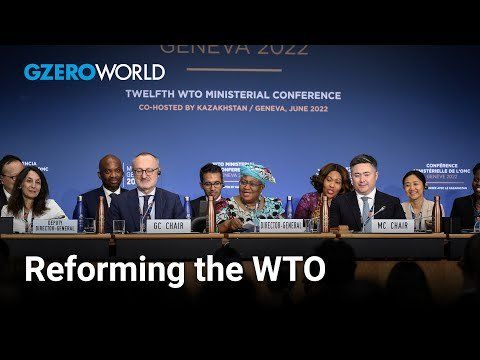October 06, 2023
The appeals body of the World Trade Organization (WTO) is like the Supreme Court for global trade. But it’s fundamentally broken: it hasn’t been able to hear any cases or issue decisions since 2019.
The US has blocked new appointments of WTO appeals judges under the Obama, Trump and Biden administrations, complaining that the organization’s rules have hurt US jobs and industry while it lets China protect its massive domestic market from foreign competition. Until WTO reform happens, the US says, it will block any new judges from sitting on the appeals bench.
Without a minimum of three appeals judges, the WTO can’t resolve disputes. And that’s a major problem for the world’s only international organization dealing with the rules of trade between nations. But there may be hope in sight.
On GZERO World with Ian Bremmer, WTO Director-General Ngozi Okonjo-Iweala said she is hopeful the dispute settlement impasse will be resolved by the WTO's 13th Ministerial Conference (MC13) in February 2024.
“[The United States] are not the only ones who have problems with the system. Developing countries also find it difficult to access,” Okonjo-Iweala says, “So let’s take all these complaints, reform system, and make it useful for everyone.”
Watch the full interview: World trade at risk without globalization, warns WTO chief Ngozi Okonjo-Iweala
Catch GZERO World with Ian Bremmer every week at gzeromedia.com/gzeroworld or on US public television. Check local listings.
More For You
World Central Kitchen staff hand out free soup in a neighbourhood that experiences electricity and heating outages following recent Russian attacks on Ukraine’s civilian infrastructure during subzero temperatures in Kyiv, Ukraine February 3, 2026.
REUTERS/Thomas Peter
1,170: The number of high-rise buildings in Kyiv that were left without heating following a barrage of Russian attacks last night on Ukraine’s capital and its energy facilities, per Kyiv Mayor Vitali Klitschko.
Most Popular
What We’re Watching: US critical minerals summit, Rafah crossing reopens, Border violence in Pakistan
Feb 02, 2026
U.S. President Donald Trump and Japanese Prime Minister Sanae Takaichi hold up signed documents regarding securing the supply of critical minerals and rare earths, at a bilateral meeting at Akasaka Palace in Tokyo, Japan, October 28, 2025.
REUTERS/Evelyn Hockstein
Representatives from the European Union, United Kingdom, Japan, and others will meet in Washington this week to discuss a strategic alliance on critical minerals.
Hard numbers: Large protests in Czechia, UAE-linked firm has large stake in the president’s company, & More
Feb 02, 2026
People take part in a rally in support of Czech President Petr Pavel, organised by Million Moments for Democracy group in reaction to dispute between President Pavel and Czech Foreign Minister and Motorists chair Petr Macinka, in Prague, Czech Republic, February 1, 2026.
REUTERS/Eva Korinkova
80,000: The number of people estimated to be in the streets of Czechia on Sunday to show their support for President Petr Pavel after he blocked the nomination of an environmental minister who performed the Nazi salute and posted Nazi memorabilia.
US President Donald Trump and musician Nicki Minaj hold hands onstage at the US Treasury Department's Trump Accounts Summit, in Washington, D.C., USA, on January 28, 2026.
REUTERS/Kevin Lamarque
The US has started handing $1,000 to the bank accounts of newborn babies. But can policies like this one help boost sagging birthrates in advanced democracies?
© 2025 GZERO Media. All Rights Reserved | A Eurasia Group media company.
